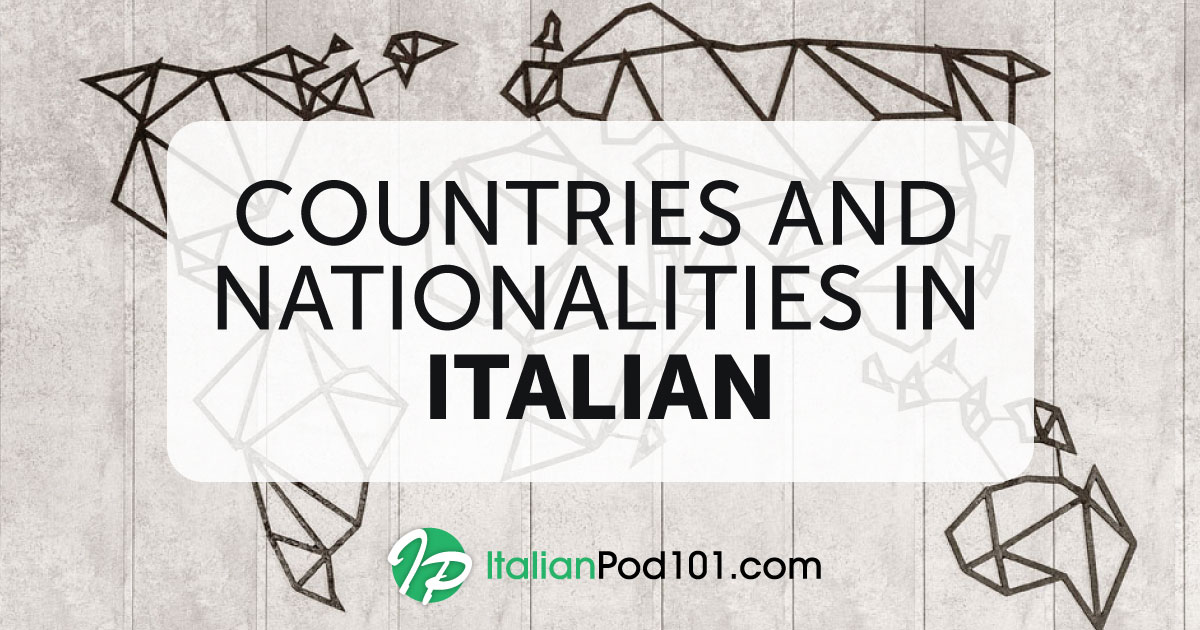Family is a vital institution everywhere in the world, but particularly in Italy. It’s not a cliche: Italians love their family, A LOT. And even if things have changed over the last few decades and huge, extended families aren’t as common as before, Italians still feel a connection toward their family members that’s hard to find in other Western countries.
But then, who doesn’t love their mom and dad, their grannies or little children, and doesn’t feel the need to talk about them with friends? As stated before, Italian extended families are greatly valued in Italian society, so knowing how to talk about them is essential. That’s why we’ve written this guide on how to talk about family in Italian.
Here at ItalianPod101, you’ll learn the basic Italian for family members, read through some Italian family phrases for reference, and discover some very interesting Italian quotes for family. But first, a little information on the average Italian family unit and Italian family roles.
Table of Contents
- Italian Family Culture: What are Italian Families Like?
- Dictionary of Terms about Family in Italian
- Respect Terms vs. Endearment Terms in Italian
- Italian Quotes and Proverbs about Family
- ItalianPod101: Learn Italian in the Blink of an Eye with Our Great Tools
1. Italian Family Culture: What are Italian Families Like?
As mentioned above, Italian families have changed a lot in recent history. Until the Fifties, Italy had a largely agricultural economy, with extended, strongly patriarchal families working on lands that they often didn’t own. Then, the economic boom and industrial development happened, with millions of people quickly moving from the poor and undeveloped countryside to the rapidly growing cities. As a consequence, the nuclear family—living in an apartment and raising a small number of children—became the norm.
Nevertheless, uncles, aunts, and cousins are still very important in Italy, probably more so than in other European countries. Cousins are the best game buddies of almost every Italian child, while uncles and aunts are teachers, baby sitters, supports, and examples.
And what about grandparents? Well, they’re simply one of the key figures of every Italian. Since the country doesn’t have a strong enough network of kindergartens, little Italian children spend a lot of their time with their grandparents while their parents are at work.
Growing up with Italian family values certainly has some great pros. As for Italian family traditions, Sunday isn’t simply a day off, but a family meeting with tons of delicious food and loud chats. And there’s always a cousin living in some small Southern city with amazing beaches, who’s very happy to host you during summer holidays.
But there are also some cons. For example, the amoral familism studied by the political scientist Edward C. Banfield in 1955 still somehow survives. That’s to say that Italians often see the interest of their family as more important than the interest of society, even when it damages collective goods.
Many of the Italian family qualities have changed over time, especially since the Italian society is now multicultural. Moreover, a growing number of young people leave the country to look for better opportunities abroad. As a consequence, families are becoming more and more the product of different cultures and experiences.
But enough with history and social sciences. Now that you know a little more about the meaning of family in Italy, let’s dive into our guide of terms about family in Italian!
2. Dictionary of Terms about Family in Italian
Do you want to know how to say “father” in Italian? And what about “mother,” “grandmother,” “aunt,” and all the other Italian family members term that every good family guy must know? Check out our dictionary.
But before that, let’s learn how to say “family” and “my family” in Italian, the root of every family-based conversation.
The Italian word for “family” is famiglia, which is similar in many other European languages. That’s because this word comes from the latin familia, which has an even more ancient origin: faama, meaning “house” in the Oscan language. Fascinating, isn’t it?
So, let’s see some examples of use:
- Example: La mia famiglia è originaria dell’Italia Centrale.
- Translation: “My family comes from Central Italy.”
- Example: Ieri sono andata a trovare la famiglia di Marco.
- Translation: “Yesterday I went to visit Marco’s family.”
- Example: Ho una famiglia molto numerosa.
- Translation: “I have a very big family.”
1- Italian Terms for Parents
- Madre: “Mother”
- Example: Mia madre è medico e lavora all’ospedale.
- Translation: “My mother is a doctor and she works at the hospital.”
- Padre: “Father”
- Example: Il padre di Andrea è molto simpatico.
- Translation: “Andrea’s father is very nice.”
2- Italian Terms for One’s Children
- Figlio: “Son”
- Example: Giovanna ha un figlio di tre anni.
- Translation: “Giovanna has a three-year-old son.”
- Figlia: “Daughter”
- Example: Mia figlia va molto bene a scuola.
- Translation: “My daughter is very good at school.”
3- Italian Terms for Siblings
- Fratello: “Brother”
- Example: Io e mio fratello non andiamo d’accordo.
- Translation: “My brother and I don’t get along.”
- Sorella: “Sister”
- Example: Mia sorella si è trasferita a Londra per studiare.
- Translation: “My sister has moved to London to study.”
4- Italian Terms for Grandparents
- Nonno: “Grandfather”
- Example: Mio nonno è stato importantissimo per me.
- Translation: “My grandfather was very important to me.”
- Nonna: “Grandmother”
- Example: Questo piatto è una ricetta che mi ha insegnato mia nonna.
- Translation: “This dish is a recipe my grandmother taught me.”
5- Italian Terms for Grandchildren, Nephews, and Nieces
- Nipote: “Grandchild” (m. and f.), “nephew,” and “niece”
- Example: Mia nipote adora la pallavolo.
- Translation: “My granddaughter loves volleyball.”
- Example: Hai già conosciuto mio nipote, Matteo?
- Translation: “Have you already met my grandson, Matteo?”
- Example: Quanti anni ha tua nipote, la figlia di tuo fratello?
- Translation: “How old is your niece, the daughter of your brother?”
6- Italian Terms for Aunts and Uncles
- Zio: “Uncle”
- Example: Lo zio di Marta vive negli Stati Uniti.
- Translation: “Marta’s uncle lives in the United States.”
- Zia: “Aunt”
- Example: La zia di Luca è molto giovane: ha solo 30 anni.
- Translation: “Luca’s aunt is very young, she’s only 30 years old.”
7- Italian Terms for Cousins
- Cugino: “Cousin” (male)
- Example: Hai chiamato tuo cugino?
- Translation: “Did you call your cousin?”
- Cugina: “Cousin” (female)
- Example: Ieri ho incontrato tua cugina al concerto.
- Translation: “Yesterday I saw your cousin at the concert.”
8- Italian Terms for Family Members as a Married Person
- Marito: “Husband”
- Example: Il marito di Lucia è appassionato di trekking.
- Translation: “Lucia’s husband is a trekking enthusiast.”
- Moglie: “Wife”
- Example: No, mia moglie non è in casa.
- Translation: “No, my wife isn’t at home.”
- Suocero: “Father-in-law”
- Example: Mio suocero era un pittore e poeta.
- Translation: “My father-in-law was a painter and a poet.”
- Suocera: “Mother-in-law”
- Example: Mia suocera purtroppo è morta prima che mio figlio nascesse.
- Translation: “Unfortunately, my mother-in-law died before my son was born.”
- Genero: “Son-in-law”
- Example: L’uomo vestito di blu è il genero di GIuliano.
- Translation: “The man dressed in blue is Giuliano’s son-in-law.”
- Nuora: “Daughter-in-law”
- Example: Io e mia nuora siamo molto legate.
- Translation: “My daughter-in-law and I are very close.”
- Cognato: “Brother-in-law”
- Example: Io e mio cognato siamo amici d’infanzia.
- Translation: “My brother-in-law and I are childhood friends.”
- Cognata: “Sister-in-law”
- Example: Andavo a scuola con tua cognata, alle elementari.
- Translation: “I went to school with your sister-in-law, at primary school.”
3. Respect Terms vs. Endearment Terms in Italian
The terms for family in Italian are both common terms and respectful terms. Unlike in other languages, Japanese for example, Italian doesn’t have specific respectful expressions when talking about a third party.
When addressing someone older than you whom you’re not familiar with, or in a formal relationship, you’re expected to use the third person lei formula. But in a family, you don’t usually do this; you simply address everyone with the second person tu. Although, if you’re about to meet your parents-in-law and they’re old, it can be polite to start with lei. Afterwards, they’ll most certainly ask you to switch to the more familiar tu.
And what about endearment terms? You’re expected to only use them in a family context, and they are:
- Papà: “Dad”
- Babbo: “Dad “in Central Italy
- Mamma: “Mom”
- Nonnina: “Granny”
- Nonnino: “Grandpa”
4. Italian Quotes and Proverbs about Famil
There are so many Italian quotes about family and local proverbs, that it’s really hard to choose which ones to include. We’ve collected a few of the most famous Italian family quotes for you below:
- Mogli e buoi dei paesi tuoi.
“When you choose a wife or a cow, it’s better to go to your own village.” - Il frutto non cade mai lontano dall’albero.
“A fruit always falls next to its tree.”
Note: This phrase means that a bad person always comes from a bad family or environment. - Parenti serpenti.
“Relatives are like snakes.”
Note: This phrase means that relatives are dangerous and traitors. - Tale padre, tale figlio.
“Like father, like son.”
5. ItalianPod101: Learn Italian in the Blink of an Eye with Our Great Tools
Are you eager to start talking to your Italian family like you’d grown up with them? Then we can help you. Here at ItalianPod101, we’ve created a series of amazing tools to help you learn Italian in a heartbeat, while having fun! For example, our super-efficient apps, that allow you to learn everywhere you are and anytime you want. And if you’re in doubt, you can always count on the advice of our friendly community.
Start now! But before you head off, let us know in the comments if there are any family terms you still want to know! We look forward to hearing from you. 🙂


















